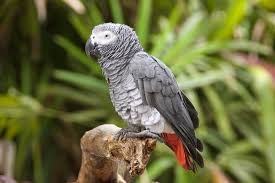The Democratic Republic of Congo (DRC) has taken decisive legal action to protect Grey Parrots from unsustainable trade, following data indicating sharp declines in their numbers across central and northern provinces.
Between 2016 and 2021, patrols conducted in the Lomami-Luidjo area of Maniema province observed a 36% drop in parrot numbers, as reported by Mongabay. The fall has been linked to intensifying illegal trapping for the pet trade.
Although African Grey Parrots were listed under Appendix I of CITES in 2016 – which should have prohibited commercial international trade – the DRC government resisted enforcement and failed to carry out a required population survey.
In July 2025, provincial authorities in Maniema seized 35 illegally caught parrots from Kituhu Island. These were handed to the Kindu Zoo for rehabilitation and release.
In March, Tshopo province banned capture and trade of the species, and by late July the national environment minister signed a decree that bans capture, sale, transport and export – except under express permission for non-commercial purposes such as research or domestication.
The trade routes are extensive: parrots are trapped during fruiting seasons (June-August), using glue traps, nest-raids and other methods, then shipped via river, air or road to trafficking hubs like Kisangani and Kinshasa. Prices rise steeply along the route, and mortality during transport is extreme – estimates suggest up to 70% of birds die before reaching transit points.
Despite legal changes, experts warn that enforcement remains weak and under-resourced. Many seized birds are cared for at centres with limited facilities, and corruption and weak oversight persist. Conservationists say the recent decree is a vital first step, but sustaining protection will depend on resources, monitoring, and political will. BirdGuide






